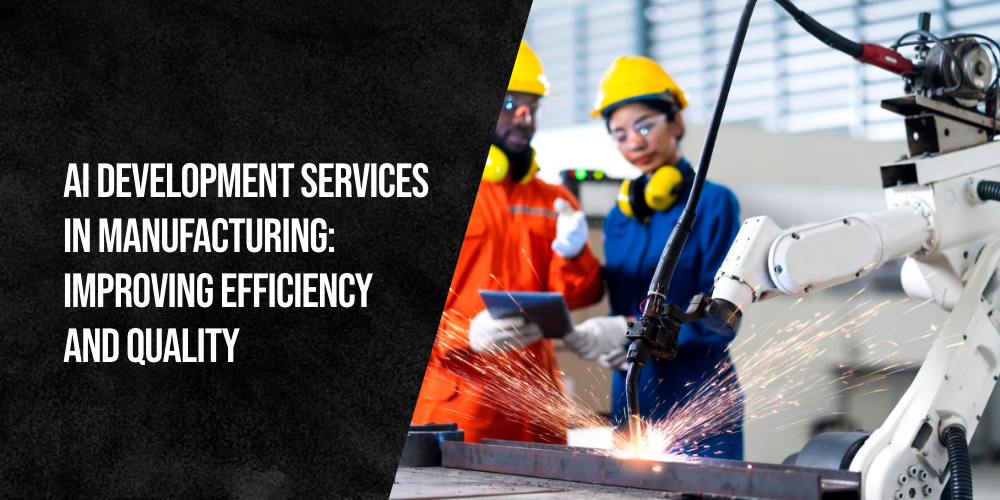
AI Development Services in Manufacturing: Improving Efficiency and Quality
For a long time, businesses in the manufacturing industry have been using automation to enhance productivity and operational efficiency. However, with the advancement in AI development services, businesses expect more productive solutions in this sector.
AI in manufacturing provides businesses with alternate and efficient ways over conventional methods, reducing labor costs and lowering unplanned downtime. According to a report by Accenture, enterprises implementing artificial intelligence in manufacturing can increase their business productivity by 40% or more in the future. In fact, 60% of manufacturers already utilize AI’s power for quality control and improvement.
This blog will guide you through an informative journey showcasing the footprint of this technology in the manufacturing domain along with its future scope in the industry.
The Impact of AI in the Manufacturing Industry
According to Gartner, AI is constantly permeating the manufacturing sector, with over 20% of manufacturers incorporating AI-based automation to attain extensive standardization. Apart from this, the R&D department of Capgemini reported that more than 44% of enterprises in this industry are currently integrating AI-powered prototypes.
These statistics demonstrate how significantly AI is impacting the manufacturing industry, marching progressively towards innovation, high productivity, and improved efficiency. Below are some prominent ways in which AI makes this sector more productive and efficient:
Quality Control
The tasks of quality assurance and control become super easy with AI due to automation testing. Computer vision and machine learning analyze data in real time for potential deviations and oddities. This ensures that the manufactured products meet the quality standards, mitigating the risks of defective items and bad customer experience.
Supply Chain Management
Manufacturers can optimize the way their entire supply chain operates by deploying AI-enabled systems that manage inventory levels and keep up with market trends. These systems can predict demand accurately, hold the right amount of inventory, and improve the relationship with suppliers to expedite deliveries.
Predictive Maintenance
The conventional maintenance approach leveraged by manufacturers relies on scheduled downtime for equipment. These tools and techniques are often costly and disrupt the entire production process. However, with AI, the potential issues in the supply chain could be easily detected, preventing them from becoming a serious problem. For the fact, around 82% of manufacturers are already using or planning to utilize AI solutions for predictive maintenance.
Collaboration Between AI and Humans
AI-powered collaborative robots can coordinate with the human workforce to help optimize monotonous tasks, saving time that could be used for more strategic operations.
Benefits of Using AI in Manufacturing
AI solutions are significantly revolutionizing the manufacturing industry, providing wide-ranging benefits that help businesses gain profit in this competitive market.
Innovative Products
With the advent of generative AI, creative AI solutions can help develop new ideas, optimize designs, and enhance the efficiency of existing ideas. The technology can be used to design new production lines and formulate advanced manufacturing strategies.
Data-driven Decisions
With the integration of AI solutions, businesses can easily avail of valuable insights from complex data sets, making productive decisions and forecasting future scope. Besides this, predictive analytics, an AI-based approach, can be used to predict the demand for products and figure out the potential issues in production.
Improved Customer Experience
Businesses can leverage chatbot development services to develop AI-powered virtual assistants that can help customers with their basic queries. This not only saves time and effort for the customer support team but also improves the experience of consumers.
High Scalability
By automating operations and optimizing processes, businesses can easily manage and complete time-consuming tasks, even when the demand is high. It helps manufacturers in scaling their business without hiring any additional resources.
What Is the Future of AI in Manufacturing?
Enterprises across the manufacturing domain are becoming increasingly smart and efficient with the widespread adoption of AI devices, robotic automation, and smart sensors. When it comes to the future scope of AI in manufacturing, there are several opportunities for businesses:
-
Smart factories and warehouses
Artificial intelligence will play a significant role in the establishment of smart factories, where the entire machinery will be interconnected in real-time. These smart factories will easily reduce waste and optimize production while maintaining seamless coordination among various manufacturing departments.
-
Seamless Automation
Automation with AI-enabled solutions will become more sophisticated, managing operations that used to be complex and exclusive to human workers. With artificial intelligence handling all the major repetitive and complex tasks, human intervention will be reduced — providing workers with additional time to focus on creativity and innovative approaches.
-
Continuous Improvement
AI in manufacturing will facilitate ceaseless improvement and growth for businesses. With multiple data sources, including sensors, machines, and customer feedback, AI- and ML-based algorithms will determine opportunities to enhance productivity. This iterative approach will propel businesses toward the path of innovation, improving their operational efficiency to stay ahead of the competition.
Final Thoughts
A high degree of automation and extensive utilization of data-driven models is continually transforming the manufacturing landscape. With the integration of professional AI services and the implementation of best practices, manufacturers can conveniently grow their business in this digital age.


